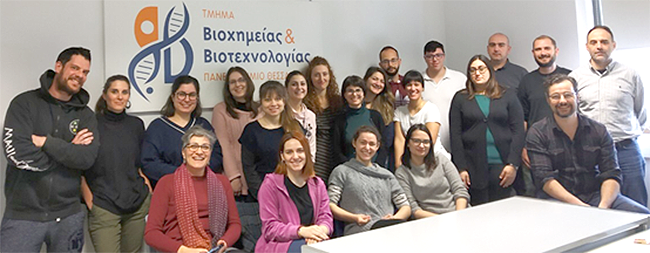Plant & Environmental Biotechnology
Brief Description
The Laboratory of Plant and Environmental Biotechnology was founded in 2015. The research focus of the laboratory is on the study of interactions between plants – microorganisms and the environment and the biotechnological applications of plants and microorganisms in (a) sustainable production processes, (b) production of bioactive molecules and (c) environmental protection. The group has access to a fully equipped laboratory in the 1st floor of the new building of the Department of Biochemistry and Biotechnology, two rooms for the growth of plants and the processing of soils and other lab rooms with the relevant instrumentation
Research Interests
- Plant Biotechnology: Plant secondary metabolism, with emphasis on the biosynthesis and functional role of triterpenes; Manipulation of synthesis in legume model and crop plants; genomic modification Expression in heterologous systems; Effect of triterpenes on plant physiology and defense; biological activity assays of crude extracts and purified molecules
- Plant Microbe – Interactions: Molecular plant-microbe interactions with emphasis on endophytic fungi, Tri-partite interactions, Multi-trophic interactions; Ecology and function of arbuscular mycorrhizal fungi, Plant – Fungal (Pathogenic and antagonistic soil-borne fungi) and Plant-Bacterial (Rhizospheric bacteria/ Legume-rhizobia symbiosis) interactions, study of the plant microbiome and its exploitation for the promotion of plant growth and the production of high quality agro-food products
- Environmental Microbiology: Microbial degradation of pesticides and veterinary drugs, isolation of degrading microbes, characterization of their hydrolytic genes/enzymes using omic approaches (genomic, transcriptomic, proteomic) and applications in environmental clean-up, evolution and mobility of pesticide-degrading and AR genes via shotgun plasmidomics, Environmental risk assessment of ARGs
- Microbial Ecology: Effects of stressors on the structure and function of the microbial community, synthetic microbial ecology and applications in environmental clean-up
- Biological functions of plant metabolites: emphasis is given on the molecular mechanisms of anticancer effects
- Molecular Diagnosis: in a variety of tissues, including human, animal, and plant organisms and environmental samples.
Personnel
- Teaching & Research Staff
- Dimitrios Karpouzas: Prof. Environmental Microbiology and Biotechnology
- Kalliope Papadopoulou: Prof. Plant Biotechnology
- Kalliopi Liadaki: Assistant Prof. Biochemical Pharmacology
- Daniela Tsikou: Assistant Prof. Molecular and Developmental Biology of Plants
- Sotirios Vasileiadis: Assistant Prof. Molecular Microbial Ecology – Genomics
- Postdocs
- Dr Chiara Perruchon: Environmental Microbiology and Biotechnology
- Dr Panagiotis Karas: Environmental Microbiology
- Dr Fotis Bekris: Environmental Microbiology, Plant Microbiome
- Dr Konstantina Rousidou: Environmental Microbiology and Biotechnology
- Dr Athanasia Katsoula: Environmental Microbiology
- Dr Liu Hongfei: Environmental and Soil Biology
- Dr Mark Swaine: Environmental Microbiology
- Dr Maria Papadatou: Environmental Microbiology and Microbial Ecology
- PhD Students
- Mariana Avramidou: IKY Fellow
- Stathis Lagos: HFRI Fellow
- Maria Feka
- Eleni Papadopoulou
- Eleni Katsivelou
- Olga Tsiouri: HFRI Fellow
- Alexandre Pedrinho: MSCA Fellow
- Anna Manukyan: MSCA Fellow
- Eugenia Koukara
- Christos Papadopoulos
- Loukia Kellari

Research Projects-Funding
An indicative list of research projects of the laboratory funded during the period 2017-2022
- MSCA-IAPP-FP7, Pesticides – Felicity or curse for the soil microbes (LOVE-TO-HATE). Funding: European Commission, Duration: 2013 –2016, Coordinator: D.G. Karpouzas, Website: http://lovetohate.bio.uth.gr
- FP7 European Projects KBBE, Triterpenoid For Commercialization, A pipeline for the discovery, sustainable production and commercial utilization of known and novel high-value triterpenes with new or superior biological activities (TRIFORC) Duration: 2014 – 2017, Partner: K.K. Papadopoulou
- RESEARCH-CREATE-INNOVATE, Development and implementation of novel biobased methods for the treatment of pesticide-contaminated wastewaters from agro-industries (MINOTAUR). Funding: General Secretariat of Research and Technology, Greece Duration: 2018-2021, Partner: D.G. Karpouzas
- Emblematic Action Routes of Vineyards, Ministry of Education, Greece. Duration: 2019-2021, Partner (D.G. Karpouzas and KK Papadopoulou)
- HFRI support of postdoctoral fellows, Looking up for novel nitrification inhibitors: New stories with old compounds. Funding: Hellenic Foundation for Research and Innovation (HFRI), Duration: 2018-2021, Coordinator Dr E. Papadopoulou. Website: http://nitric.bio.uth.gr
- MSCA-IF-Η2020, Exploring microbial networking in pesticides biodegradation: novel inocula and biocatalysts for biodepuration of agro-industrial effluents (EMIGRATE). Funding: European Commission, Duration 2017-2019, Fellow Dr S. Vasileiadis, Coordinator: D.G. Karpouzas, Website: http://emigrate.bio.uth.gr
- Research Infrastructure project, The research infrastructure of Synthetic Biology in Agro-Nutrition (OMIC-Engine) Funding: Ministry of Development, Finance and Tourism. Duration 2017-2019, Role: Member of the Coordinating Committee KK Papadopoulou and D.G. Karpouzas
- RESEARCH-CREATE-INNOVATE call, Mixed microbial inocula for vegetable production in the Western Peloponnese – application to soil, propagating material, hydroponics, enhanced growth substrates. Duration: 2018-2020, Role: Partner (KK Papadopoulou & D.G. Karpouzas)
- Emblematic Action Routes of Olives, Funding Body: Ministry of Education, Greece. Duration: 2018-2020, Role: Partner (K.K Papadopoulou, D.G. Karpouzas)
- PRIMA, Section2 (2019-2022) Innovative tools to combat crop pests in the Mediterranean (INTOMED), Funding: GSRT, Coordinator: KK. Papadopoulou
- MSCA-IF-H2020 RNA sprays as a tool for crop improvement and protection (RNASTIP), Funding: European Commission, Duration: 2018-2020, Fellow: Dr Dalakouras, Coordinator: KK. Papadopoulou, Website: http://rnastip.bio.uth.gr/
- MSCA-ITN-H2020 The European Industry – Academia Network for RevIsing and Advancing the Assessment of the Soil Microbial TOxicity of Pesticides (ARISTO). Funding: European Commission, Duration 2020-2024, Coordinator: D.G. Karpouzas
- HFRI Support to Postdoc Fellows, INteractions of Veterinary antibiotics with soil microorganisms: exploiting microbial degradation to avert Environmental contamination and ResisTance dispersal (INVERT). Duration 2021-2023, Coordinator: S. Vasileiadis
- SFS-21-2020 – B, RIA-H2020, MIcro- and NAno-Plastics in AGRIcultural Soils: sources, environmental fate and impacts on ecosystem services and overall sustainability (MINAGRIS), Duration 2021-2026, Scientific Coordinator: D. Karpouzas. Website: www.minagris.eu
- HFRI Call for the Support of Academia, Revolutionizing the assessment of the toxicity of pesticides on soil microorganisms: from single species tests to ecosystem approaches (ReASSESS). Duration: 2021-2023, Coordinator: D. Karpouzas
Publications
Indicative recent publications of the group for the period 2017-2022 are presented:
- Papazlatani C., Kolovou M., Azis K., Mavriou S., Testebasis S., Ntougias S., Karpouzas D.G., (2022) Isolation, characterization and industrial application of a Cladosporium herbarum strain able to degrade the fungicide imazalil. Environmental Pollution 301:119030
- Bekris F., Vasileiadis S., Papadopoulou E., Samaras A., Testembasis S., Gkizi D., Tavlaki G., Tzima A., Paplomatas E., Markakis E., Karaoglanidis G., Papadopoulou K.K., Karpouzas D.G., (2021) Grapevine wood microbiome analysis identifies key fungal pathogens and potential interactions with the bacterial community implicated in grapevine trunk disease appearance. Environmental Microbiome 16: 23 https://doi.org/10.1186/s40793-021-00390-1
- Dalakouras A, Wassenegger M, Dadami E, Ganopoulos I, Pappas MI, Papadopoulou KK (2020) Genetically modified organism free RNA interference: Exogenous application of RNA molecules in plants. Plant Physiology 182, 1–13
- Storck V., Gallego-Blanco S., Vasileiadis S., ……, Karpouzas D.G., Martin-Laurent F. (2020) Insights into the function and horizontal transfer of isoproturon degrading pdmAB genes in a biobed system. Applied and Environmental Microbiology 86(14), e00474
- Gruden K, Lidoy J, Petek M, Podpečan V, Flors V, Papadopoulou KK et al., (2020) Ménage à trois: unraveling the mechanisms regulating plant–microbe–arthropod interactions. Trends in Plant Science 25(12): 1215-1226
- Skiada V., Avramidou M., Bonfante P., Genre A., Papadopoulou KK (2020) An endophytic Fusarium–legume association is partially dependent on the common symbiotic signalling pathway. New Phytologist 226: 1429-1444
- Petrou M., Karas P.A., Vasileiadis S., …… Karpouzas D.G., (2020) Irrigation of radish (Raphanus sativus L.) with microcystin-enriched water holds low risk for plants and their associated rhzisopheric and epiphytic microbiome. Environmental Pollution 266: 115208
- Papadopoulou E.S., Bachtsevani E., Lampronikou E., Adamou E., Katsaouni A., Vasileiadis S., Thion C., Menkissoglou-Spiroudi U., Nicol G.W., Karpouzas D.G, (2020) Comparison of novel and established nitrification inhibitors relevant to agriculture on soil ammonia- and nitrite oxidizing isolates. Frontiers in Microbiology 11: 2795
- Perruchon C., Vasileiadis S., Papadopoulou ES., Karpouzas D.G., (2020) Genome-based metabolic reconstruction unravels the key role of B12 in methionine auxotrophy of an ortho-phenylphenol-degrading Sphingomonas haloaromaticamans. Frontiers in Microbiology 10 https://doi.org/10.3389/fmicb.2019.03009
- C Garagounis, D Tsikou, PK Plitsi, IS Psarrakou, M Avramidou, ..Papadopoulou KK (2019) Lotus SHAGGY‐like kinase 1 is required to suppress nodulation in Lotus japonicus. The Plant Journal 98 (2), 228-242
- Kavroulakis N., Tsiknia M., Ipsilantis I., …… Karpouzas D.G., Papadopoulou K., Ehaliotis C. (2020) Arbuscular mycorrhizal fungus inocula from coastal sand dunes arrest olive cutting growth under salinity stress. Mycorrhiza 30:475–489
- Tsikou D, Ramirez EE, Psarrakou IS, Wong JE, Jensen DB, Isono E, Radutoiu S, Papadopoulou KK (2018) A Lotus japonicus E3 ligase interacts with the Nod factor receptor 5 and positively regulates nodulation. BMC Plant Biology 18:217
- Tsikou D, Yan Z, Holt D.B., et al., (2018) Systemic control of legume susceptibility to rhizobial infection by a mobile microRNA. Science 362(6411): 233-236
- Vasileiadis, S., Brunetti, G., Marzouk, E., (…), Lombi, E., Donner, E. (2018) Silver Toxicity Thresholds for Multiple Soil Microbial Biomarkers. Environmental Science and Technology 52:8745-8755
- Vasileiadis S., Puglisi E., Papadopoulou E.S., Pertile G., Suciu N., Papolla, A., Tourna M., Karas P.A., ….. Karpouzas D.G (2018) Blame it on the metabolite: 3,5-dichloraniline rather than the parent compound iprodione induces strong effects on the diversity and function of soil microorganisms. Applied Environmental Microbiology 84(22): e01536-18
PhD Thesis
- Ioanna Mirtziou: The role of nitrate on the antioxidative system of Medicago truncatula, Supervisor: K. Papadopoulou (2013)
- Demetra Katsarou: Biosynthesis and regulation of glucosinolate metabolism in Εruca sativa, Supervisor: K. Papadopoulou (2014)
- Afrodite Krokida: Biosynthesis and role of triperpenoids on the development and function of roots and nodulates on the legume model-plant Lotus japonicus Supervisor: K. Papadopoulou (2014)
- Chiara Perruchon: Study of the molecular mechanisms involved in the detoxification of fungicides contained in agro-industrial effluents, Supervisor: D Karpouzas (2014)
- Panagiotis Karas: Biological treatment of agro-industrial wastewaters with high, Supervisor: D Karpouzas (2016)
- Vasiliki Skiada: Endophytic fungi in plant roots: colonization patterns and mechanism of plant protection under conditions of biotic or abiotic stress. Supervisor: K Papadopoulou (2019)
- Athanasia Katsoula: Study of the function and diversity of microbial communities in plant phyllosphere and interactions with the environment, Supervisor: D Karpouzas (2019)
- Konstantina Rousidou: Study of the dynamics of bacterial genes involved in the degradation of organophosphate and carbamate insecticides, Supervisor: D Karpouzas (2019)
- Christina Papazlatani: Study of the efficiency and microbiology of biobed systems receiving pesticide-contaminated wastewaters from various agro-food industries, Supervisor: D Karpouzas (2022)
- Stathis Lagos: The biodegradation of veterinary drugs as method to avert environmental contamination and antibiotic resistance gene dispersal, Supervisor: D Karpouzas (on going)
- Marianna Avramidou: The activity and mechanisms used by endophytic fungi to promote plant growth and defense in legumes, Supervisor: K Papadopoulou (on going)
- Eleni Papadopoulou: Study of the role of the microbiome of local vines varieties and vinification on the quality of wine products Supervisor: D Karpouzas (on going)
- Eleni Katsivelou: Environmental fate and interactions of veterinary antibiotics with the soil microbial community: Resistance, biodegradation or ecotoxicity? Supervisor: D Karpouzas (on going)
- Maria Feka: Beneficial microbes and natural metabolites as novel tools in enhancing stress resilience in plants Supervisor: K Papadopoulou (on going)
- Alexandre Pedrinho: Study of the toxicity of biopesticides on the soil microbial community Supervisor: D Karpouzas (on going)
- Anna Manukyan: Study of the toxicity of pesticide on natural assemblages of arbuscular mycorrhizal fungi. Supervisor: K. Papadopoulou (on going)
- Christos Papadopoulos: Evaluation of the toxicity mechanisms of pesticides on Arbuscular Mycorrhizal Fungi in varying levels of experimental complexity (from in-vitro to field). Supervisor: D. Karpouzas (on going)
- Loukia Kellari: Study of the epigenetic changes in Lotus japonicus and Nicotiana benthamiana plants, after their colonization by FsK, a beneficial endophytic fungus. Supervisor: K. Papadopoulou (on going)
- Olga Tsiouri: Comparative and functional genomic analysis of the interactions between plants and endophytic fungi. Supervisor: K. Papadopoulou (on going)
Services
- Determination of the microbiome in soil, plant, food samples using amplicon sequencing approaches and bioinformatic tools.
- Assessment of the population of soil borne fungal pathogens in agricultural soils using diagnostic q-PCR tools.
- Assessment of the environmental fate of pesticides in the frame of the environmental risk assessment.
- Determination of the toxicity of pesticides on soil microorganisms based on relevant OECD protocols.
- Molecular identification of microorganisms, pathogenic or beneficial, from soil, plant and food samples.

Laboratory of Plant & Environmental Biotechnology
Department of Biochemistry and Biotechnology (1st Floor)
University of Thessaly
Viopolis, 41500 – Larissa
Contact
2410-565232
plantenvlab-at-bio.uth.gr
Lab website





